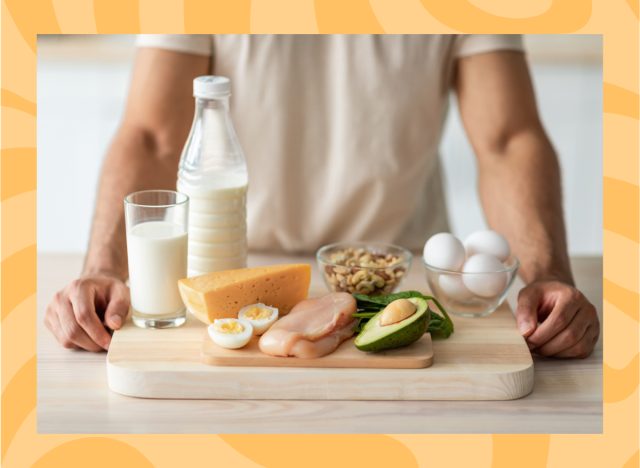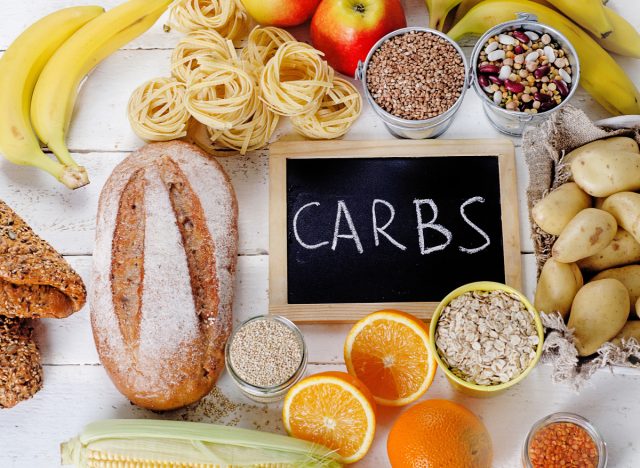6 Eating Habits To Regain Muscle Mass as You Age

Have you flexed a biceps muscle in the mirror lately? Well, there are more important reasons to hold on to your muscle as you age that extend beyond looking good in a T-shirt and avoiding “bat wings.” Studies show that loss of this metabolically active muscle tissue over the decades is associated with chronic health conditions, including insulin resistance and metabolic syndrome, in addition to frailty, fatigue, and falls. The scientific term for age-related skeletal muscle and strength loss is sarcopenia, and it usually begins in one’s 40s. With this in mind, what are some eating habits you can adopt to regain muscle as you age?
Before we get into helpful diet habits, let’s take a deeper look at sarcopenia. This condition can be prevented, and even reversed, in the elderly, as well as in middle-aged people who are just starting to notice a loss of muscle mass. Strength training obviously is a big part of the solution, but pumping iron won’t build muscle without the right fuel. Adopting certain key eating habits will fuel your workouts and help your resistance training build new muscle as you age.
According to certified strength and conditioning specialist and sports chiropractor Dr. Matt Tanneberg, CSCS, regaining muscle with exercise requires three main habits: consuming enough calories, consuming enough quality protein, and getting those nutrients throughout your day— and especially before and after workouts.
“Muscle growth is directly linked to nutrition and is impacted negatively when your nutrition isn’t supplementing your body properly,” Tanneberg tells Eat This, Not That!
To effectively rebuild muscle, try incorporating the following eating habits into your routine in conjunction with a quality strength-training routine.
Get enough of your vitamins.

When it comes to building and regaining muscle as you age, it’s important to make sure you’re eating foods that provide you with adequate amounts of vitamins. And if you’re unable to get these vitamins through your daily meals, you may want to talk with your doctor about supplementation.
According to an article published in Nutrients, vitamins D and omega-3 fatty acids are helpful in fighting sarcopenia when coupled with resistance training. This report also states that vitamin D is essential to skeletal muscular health and that deficiency in this nutrient can lead to an increased progression of sarcopenia, and may even lead to more falls and bone fractures. Additionally, it notes that omega-3s contain anti-inflammatory properties, and therefore may improve the health of bodily tissue and muscle.
You can get vitamin D through fatty fish, eggs, many dairy products, and fortified orange juice and cereals. For omega-3s, you can eat fatty fish, nuts, seeds, or plant oils.
Get enough macronutrients.

People trying to shape up often restrict the number of calories they eat in a day. However, this can backfire if you’re looking to add muscle, because you need fuel to power resistance exercise and spur muscle growth. So, don’t starve or short-change yourself on any of the three macronutrients.
“It’s important to have adequate calories in your diet and actually a caloric surplus, if you’re looking to gain muscle weight,” says Amy Goodson, MS, RD, CSSD, a member of our Medical Expert Board who also served as a sports dietitian for the Dallas Cowboys.
While many may be under the impression that protein alone is the key to building muscle, experts say that eating a well-balanced meal and diversifying your food is one of the most important eating habits to regain muscle as you age. “While protein is the fuel for muscles, you still need to eat a balanced diet with enough carbohydrates and fats to optimize your nutrition for muscle growth,” says Tanneberg.
Eat some protein at every meal.

“Most people eat the bulk of their protein at dinner, but research suggests that it’s easier to build muscle tissue when protein intake is spread out throughout the day,” says Elizabeth Ward, MS, RDN, an award-winning nutrition communicator, recipe developer, writer, and co-author of The Menopause Diet Plan, A Natural Guide to Hormones, Health and Happiness.
Ward recommends shooting for between 1.2–1.6 grams of protein per kilogram of your body weight every day. So, for a person who weighs 160 pounds, this would amount to approximately 88–117 grams of protein. Looking for some ideas on how to incorporate this nutrient into your favorite meals? Try one of these High-Protein Recipes for a Faster Metabolism.
Choose complete proteins.

Speaking of getting enough protein, experts recommend focusing on complete protein sources.
“This means they contain all of the amino acids that the body needs to build muscle,” Ward says. “Lean animal foods, such as eggs, lean beef, poultry, and seafood, as well as low-fat dairy foods such as cottage cheese, milk, and Greek yogurt, are excellent sources of complete protein. In addition, animal foods are rich in the amino acid leucine, which triggers muscle cell production.”
Plants also contain protein used to make muscle. Soy foods—such as tofu, edamame, and unsweetened soy milk—are foods that, like animal foods, supply complete proteins. Examples of healthy plant foods that are incomplete proteins chickpeas, black beans, quinoa, lentils, peanuts, almonds, pistachios, and walnuts.
Consume high-quality carbs, too.

Carbohydrates, such as whole grains and legumes, as well as some dairy, fruits, and vegetables, are important for regaining muscle growth. As the body’s preferred source of energy, carbs provide an array of vitamins, minerals, antioxidants, and fiber. What’s more, carbs reprieve protein.
“When you restrict carbs from your diet, you deplete the glycogen or stored sugars in your body to get energy,” explains Johna Burdeos, RD. “Carb restriction will cause muscle loss, and no carbohydrates means your body has to start breaking down its own muscle for energy.”
Prep your body for growth.

When it comes to eating habits to regain muscle, nutrient timing plays an important role in optimizing your efforts. “You should always eat a pre-workout snack or meal about one hour before you start resistance training. It should include sufficient amounts of carbohydrates, your body’s main source of energy,” says Tanneberg. “Post-workout is when you should go more protein-heavy to replenish the muscles that are in the healing phase.”
“Ideally, you have a whey protein shake or equivalent source of protein within 15–30 minutes after your workout,” Tanneberg continues. “Chocolate milk is great post-workout because it has a perfect balance of carbs, fats, and proteins for muscle recovery.”
A previous version of this story was published on October 20, 2022. It has been updated to include additional copy and proofreading revisions, additional research, and updated contextual links.
- Source: https://www.ncbi.nlm.nih.gov/pmc/articles/PMC8541622/
- Source: https://my.clevelandclinic.org/health/diseases/23167-sarcopenia
- Source: https://www.ncbi.nlm.nih.gov/pmc/articles/PMC4066461/
- Source: https://pubmed.ncbi.nlm.nih.gov/9310077/
- Source: https://www.ncbi.nlm.nih.gov/pmc/articles/PMC7399875/









